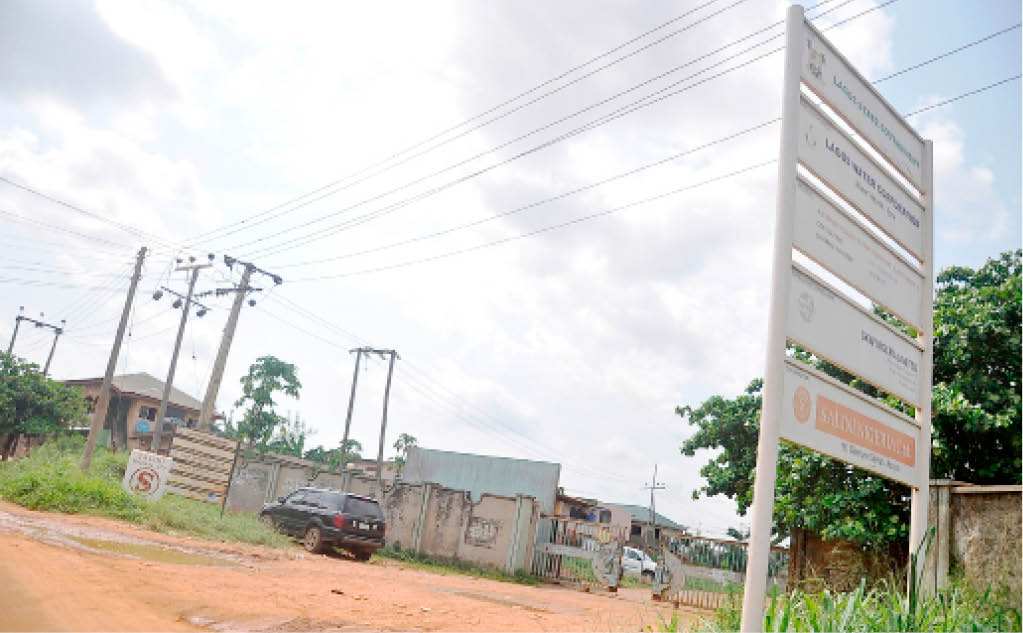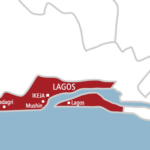With an estimated population of over 24 million people, Lagos State has a daily water requirement of about 750m gallons a day, but the production capacity of all the water works spread across the state is less than 300m gallons a day. The Agbado-Ijaiye water work project started in the year 2008 was conceived to address this shortfall, but 13 years after, the project has suffered delay while water supply is shrinking and residents of the commercial city are forced to seek other informal sources to meet this shortfall.
“I have been in this neighbourhood for the past 15 years and the only source of water supply is the well water and the boreholes built by households. We have water corporation here with a gigantic water work ongoing but we have never enjoyed water supply from the corporation.”
The above were the words of Mr. Israel Olawale, a resident of Adiyan, a town bordering Lagos and Ogun State. The Lagos State Government is presently constructing a water work that is expected to serve not only the Adiyan residents but millions of Lagos residents.
From 2008 when the water work project was awarded, it has suffered abandonment and neglect while water scarcity bites harder.
Olawale is not the only resident constantly in lamentation over the non-existent water supply in the area; many Lagos residents, who the water is expected to largely serve, have devised other means to source for water. As water is life, they could not afford to place their hope and aspiration on uncertainty as they said.
Yes, they are uncertain as the water work project drags and millions of Lagosians resort to vending to meet their water needs.
Lagos State with an estimated population of over 24 million people has a daily water requirement of about 750m gallons of water per day, according to analysis by the state water corporation.

But the production capacity of all the water works spread across the state is less than 300m gallons a day. The deficit is being filled from other informal sources.
Daily Trust reports that the Agbado-Ijaiye water work project, better known as the Adiyan water work phase two, started in the year 2008. 13 years after, the project has suffered delay while water supply is shrinking as population explodes.
It was learnt that the contract was awarded in 2008 by the Ogun-Osun River Basin Development Authority (OORBDA) Abeokuta for the sum of N565.1m while N404.7m was paid, according to the 2016 audit report by the Federal Government published by Value for Money, a civil society organisation.
From 2008, the project sited on 210 hectares of land in Adiyan, a borderline community between Lagos and Ogun states, became deteriorated and eventually abandoned, thus dashing the hope of many Lagosians who were expecting water from the 70m gallons a day water work.
It was abandoned for almost a decade until 2019 when the state governor, Mr. Babajide Sanwo-Olu, revived the project.
The water work project, it was further learnt, was conceived to complement the Iju Water work which has become grossly inadequate to serve the people of the state in view of the increasing population.
Findings indicated that the Iju water work was built in 1908 when the population of the state was less than 100,000. So, it is impossible for the same water work to cater for the present needs of over 20m Lagosians.
Sanwo-Olu, who inspected the project in 2019 after re-mobilising, said his administration decided to complete the abandoned water project because of its strategic importance to the wellbeing of the people.
He said the revival of the project would help his government to address the causes of poverty and fight diseases.
He said: “When this water works project is fully completed, it will be the biggest of its type anywhere around Nigeria and we will be raising the capacity of our potable water supply by 330,000 cubic metric tons per day, which is more than 70m gallons.
“The commitment from our side is for us to see how we are going to finish this project on time and as much as possible within the budget. The contractor has said it is committed to seeing how the project will be completed in the next 18 months. Our government will work with the contractor and the project consultant to deliver this project on agreed time.
“If we achieve this within the next two years, we would be achieving one of the key items of Sustainable Development Goals (SDGs), which is also a strategic pillar of our development agenda in the area of provision of safe drinking water to over five million citizens of Lagos.”
State of the project
After being abandoned for almost a decade, the project has bounced back, getting the deserved attention from the state government.

Unlike other water works which have been stalled, the water work project in Agbado-Ijaiye is ongoing as observed by our correspondent during a visit.
When our correspondent visited the site location at Agbado-Okearo road, Ogun State, the location looked almost abandoned with very few workers: security officers and laborers, left on site.
The project location, although still in existence, with a few labourers still at work, looks dilapidated from the outside as overgrown grasses now occupy most of the areas within the site while middle aged women now farm on other areas within the site.
This was confirmed by one of the security officials for Lagos Water Corporation who spoke on the condition of anonymity.
He said, “people live here while we also have some farmers around who work here.”
Inside the premises again, tractors and other construction machineries were seen on sight with a few labourers at work.
An official of the state Lagos Water Corporation who did not want his name in print because he was not authorised to speak to the media said he has worked at the project for eight years.
“When you look around, you would think this place is abandoned but go inside, you could see the project is ongoing but I am afraid they might not allow you access into the premises without official permission. If you go inside, you would observe that serious work is going on but I cannot tell you the stage of the work,” he said.
Officials of SALINI Nig Ltd, the company in charge of the project, also refused to entertain enquiries from the journalists, saying such enquiries should be directed to their head office in Abuja.
But with Sanwo-Olu taking over the project and promising to complete it in 18 months, residents of Lagos hope to witness a new lease of life with availability of potable water.
This is why another resident, Mr. Sakiru Ayinde living at Agbado Road appealed to the state government to drive the project to fruition.
“I cannot begin to explain how unfortunate it is that we have something in our sokoto (trouser) and we are still going to Sokoto. How do we continue with this? Where is the dividend of democracy”?
He stated that many residents of Lagos still buy water, build their individual boreholes and dig well to meet their water needs.
“We have our own water sourced independently. We have our borehole, we have a well. We don’t have any relationship with the water corporation at the moment.”
However, the Lagos Water Corporation said the project is 85 percent completed, adding that on completion, it will serve residents in the western axis of the state.
Benefiting communities will include Ikotun, Idimu, Isolo, Agege I & II, Ajegunle, Lagos west, Amuwo Odofin etc.
Operations on the electro-magnetic aspect of the project have improved tremendously, and this is expected to electrically power the waterworks pumps.

 Join Daily Trust WhatsApp Community For Quick Access To News and Happenings Around You.
Join Daily Trust WhatsApp Community For Quick Access To News and Happenings Around You.


